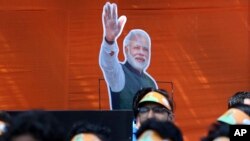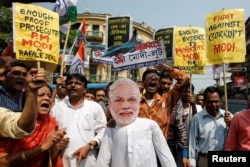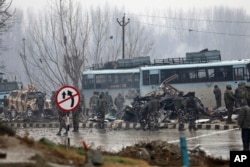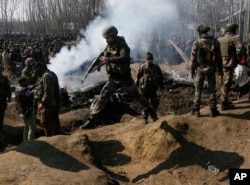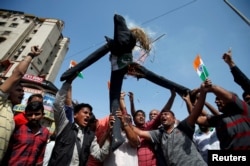At public meetings and election rallies held since the recent confrontation between India and Pakistan, Indian Prime Minister Narendra Modi has been tapping into a wave of nationalistic sentiment sweeping the country and presenting himself as a strong leader willing to take a more muscular approach to Pakistan.
“I want to assure citizens that the nation is in safe hands,” Modi told a cheering audience at an election rally after India carried out airstrikes on an alleged militant camp in Pakistan.
Days later at another public meeting, he said India would no longer be helpless in the face of terror. “This is a new India. We will pay back terrorists with interest.”
But as the country prepares to elect a new government, the question being asked is: will the surge in support for the Indian leader, who until weeks ago was seen as struggling in his bid to win a second term in office, translate into votes?
The ruling Bharatiya Janata Party (BJP) has quickly embraced national security as a mainstream electoral plank and issues such as joblessness and farmers' distress, on which the Indian leader was vulnerable, have been put on the back burner.
Polling agency C-Voter says the Indian Prime Minister’s approval ratings, which had plummeted to an all-time low in January, have jumped to over 60 percent and are now close to previous highs.
“Modi being the biggest brand for his party, Modi being the biggest brand for Indian election at this point of time — if his brand value is going back to similar sort of highs as in 2014-15, it augurs well for his party,” said Yashwant Deshmukh, the head of C-Voter polling agency.
He said rising support for the Indian leader cuts across all voter segments.
“The positivity around that strike and the upswing for Modi is pretty much everywhere," he added. "How much that party can benefit from it remains to be seen.”
A suicide attack on February 14 in Pulwama in Indian Kashmir, which killed 40 paramilitaries, came just weeks before national elections and triggered fury in India. A Pakistan-based Islamist militant group, the Jaish e Mohammad claimed responsibility for the attack.
For the first time in nearly 50 years, India carried out airstrikes in Pakistan on what it said was a training camp run by the Jaish e Mohammad at Balakot. Pakistan responded with retaliatory strikes in which one Indian jet was downed and an Indian pilot captured.
Islamabad returned the pilot two days later helping calm tensions that had raised fears of a wider conflict.
“There is no doubt that the strikes played well domestically and will provide the BJP with a new sense of momentum headed into general elections,” said Milan Vaishnav, senior fellow and director of the South Asia Program at the Carnegie Endowment for International Peace. “The mood in India favored a military response to the Pulwama attack, and Modi has delivered on that.”
In the days since, the prime minister, whose right-wing BJP swept the 2014 elections, has sought to cash in on his image as a strong leader. And he has hinted that he will not soften his tough approach. “This was a pilot project,” he told a gathering of scientists without directly alluding to the strikes.
At the height of the hostilities, Modi appealed to the opposition to refrain from politicizing the airstrikes. But angry opposition parties now accuse him of doing exactly that and using them for electoral advantage. They have demanded proof that the airstrikes killed many militants, pointing to reports that have cited satellite imagery to cast doubts over claims that a militant camp was damaged. The BJP has countered by questioning their patriotism.
The charges and counter charges are unlikely to impact perceptions of those who applauded the airstrikes.
“The last time we know was 1999 when a similar war-like situation happened in Kargil, and BJP certainly benefited from that,” says Rahul Verma, a political analyst and fellow at the Center for Policy Research in New Delhi. “Nationalistic sentiment most likely helps the incumbent, and specially if the incumbent is of a rightwing party.”
For the time being, opposition parties are struggling to refocus attention on issues on which the BJP is on the back foot: falling rural incomes and high rates of unemployment. It was these issues that contributed to the party’s defeat in two key state elections in December.
But as the weeks pass by, such core concerns of millions across the country could again emerge center stage, especially in rural communities where national security and foreign relations barely get any traction.
Elections are expected to be announced in the coming days and begin sometime in April.
Analysts say though Modi and the BJP got a lift with the India-Pakistan confrontation, the contest remains wide open.
“The BJP would like to change the narrative to national security and terrorism, but it won’t be so easy. Bread-and-butter issues like employment, development, and welfare will still be topmost for most voters,” said Vaishnav.




